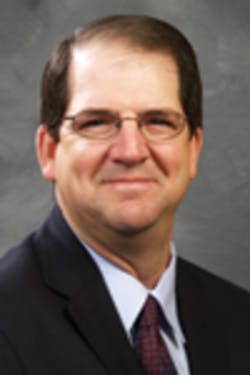With a membership base of more than 2,400 CIOs and over 150 healthcare IT vendors and professional services firms, the Ann Arbor, Mich.-based College of Healthcare Information Management Executives (CHIME) plays a major role in health IT advancement efforts. At the head of the organization is Russell Branzell, CHIME’s president and CEO, who has been in his current role for almost five years.
Branzell, a former health system CIO himself, is well aware of the many challenges and pressures that CIOs and other healthcare C-suite leaders face today. Perhaps more than ever before, Branzell and his fellow CHIME senior leaders will be relied upon to help steer patient care organizations in the right direction as they enter into the new healthcare. At the CHIME 2017 Fall CIO Forum in San Antonio, Texas, Branzell spoke with Healthcare Informatics Managing Editor Rajiv Leventhal about the pressures CIOs are facing, where CHIME stands on certain policy issues, and more. Below are excerpts of that discussion.
What do you see as the core concerns right now for your members in this current healthcare landscape?
Cybersecurity has everyone focused, if not completely stressed out. Healthcare, as a general whole, has been late as an industry with this, and now with so much attention—whether it’s bad people trying to do the wrong things or just the general opinion of the public—we need to be doing more in this area. The larger organizations are doing fairly well, but even so, when you [look at] equivalent large industries to healthcare—meaning big banks and big manufacturers—they have far more resources dedicated toward cybersecurity and are actually [threatened] less.
Also, the industry as a whole is in significant transition, preparing for a future that’s often unknown. So whether it’s meaningful use, risk-based contracting, pay-for-performance, pick the buzz word, everyone knows we are moving in this direction, and they are preparing for it, but they are also still preparing for an unknown since many are operating in a fee-for-service environment. So there are cost restrictions, and organizations are trying to become lean and mean, and operate in this future world, but often it’s an unknown world.
Russ Branzell
From a policy standpoint, CHIME has been at the forefront of providing insightful comments on government regulations. How do you see things progressing when it comes to MACRA/MIPS? Are you more confident or worried?
Well, no matter what the government puts out there, there will be a portion of the constituency who will not be happy about it. What I do believe we’re seeing, and this is truly bipartisan, is that they are willing to listen as things are moving through the process and being finalized, and adapt when things aren’t working as well. So I think we generally like the process we’re going through, but we do always have some form of comment or concern, or areas of focus.
One good example is that as you go through the process of realignment for physicians, the hospital side is not being fixed at the exact same time, as if these worlds are not an emerged environment. Most physicians, well over 50 percent, are working within a confined health system, meaning they are either employed or deeply contracted, so we change the rules and requirements for how physicians are paid, but we don’t change it for the hospitals to match that. It just doesn’t make much sense.
Why do you think there has been this lack of alignment?
Part of the reason is that you have lobbyists in Washington D.C. who did a very good job of representing the smaller portion of the industry—not smaller in size, but smaller meaning they might have represented more specialty-based physicians. So they get their voice out there, but sometimes due to the complexity, they don’t address the other [hospital] side of it.
But even in non-policy areas, there is still as much natural conflict. An example is that you get pushback that we need to be more interoperable and we need to be less difficult from a sharing data perspective, and we want to be empowering patients more with data flowing smoothly. At the exact same time, we get pressure from OCR that you need to be super tight with security or there will be penalties. Those two things just come at odds with each other in today’s world. It’s not that we don’t try, but these things naturally have a conflict point.
Are CHIME’s members mostly prepared for MACRA or do you see the same concern that’s being expressed in many of these industry surveys that reveal a lack of readiness?
This is an overgeneralization, but it’s been a general truth that you can almost divide our industry at just about any given time into thirds. There are the proactive groups that are way ahead of the curve and ready at any given time; then the third that will come in near the finish line and do a good job; and then the third that doesn’t have the resources, skills, or staff in place—smaller, rural, or standalone places that will struggle to the very end. So our job is to help them and share best practices from the big guys, the ones that are proactive.
One of CHIME’s biggest initiatives is its National Patient ID Challenge. How are things progressing here?
This is taking longer than we thought, and part of that is the significant complexity, and also how the industry and technology keep moving. Phase one testing is being completed and we are in the process of evaluating that information. With this challenge, it’s a gatekeeping process and you do evaluations of levels of readiness to move forward. But the industry and technology continue to change since we started this initiative. So we need to pause and reevaluate, but we’re absolutely committed long-term to ensuring that some kind of solution will be in place. We are hopeful that the HeroX prize will be the methodology, but it has been much more difficult than we thought it would be. But we will continue to support a solution long-term, and it may or may not be the HeroX prize [that is the solution].
What advice can you give CIOs who are feeling as pressured as ever these days?
That is one of the primary areas that I get most concerned about—the overall health and wellbeing of our membership. It’s a very high-pressure point in time and this sounds simplistic, but we encourage our members to really take care of themselves. We are seeing a natural maturation of our members. We have had a maturity model for health IT and CIO leaders, which guided us to what we called the 2.0 leader. Now we are seeing this 3.0 leader, not just for CIOs, CMIOs and others, but for all leaders in organizations. These leaders are digital leaders of the future—the digital CEO, digital CMO, and digital CFO. And the person to move everyone along in that way is a great IT leader who can help the entire organization mature in its digital strategy.



